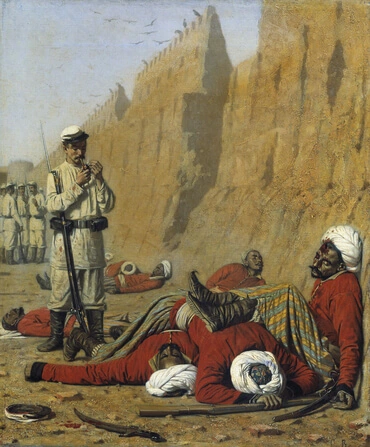1
En ce temps-là, les Philistins rassemblèrent leurs troupes et formèrent une armée, pour faire la guerre à Israël. Akisch dit à David: Tu sais que tu viendras avec moi à l'armée, toi et tes gens.
2
David répondit à Akisch: Tu verras bien ce que ton serviteur fera. Et Akisch dit à David: Aussi je te donnerai pour toujours la garde de ma personne.
3
Samuel était mort; tout Israël l'avait pleuré, et on l'avait enterré à Rama, dans sa ville. Saül avait ôté du pays ceux qui évoquaient les morts et ceux qui prédisaient l'avenir.
4
Les Philistins se rassemblèrent, et vinrent camper à Sunem; Saül rassembla tout Israël, et ils campèrent à Guilboa.
5
A la vue du camp des Philistins, Saül fut saisi de crainte, et un violent tremblement s'empara de son coeur.
6
Saül consulta l'Eternel; et l'Eternel ne lui répondit point, ni par des songes, ni par l'urim, ni par les prophètes.
7
Et Saül dit à ses serviteurs: Cherchez-moi une femme qui évoque les morts, et j'irai la consulter. Ses serviteurs lui dirent: Voici, à En-Dor il y a une femme qui évoque les morts.
8
Alors Saül se déguisa et prit d'autres vêtements, et il partit avec deux hommes. Ils arrivèrent de nuit chez la femme. Saül lui dit: Prédis-moi l'avenir en évoquant un mort, et fais-moi monter celui que je te dirai.
9
La femme lui répondit: Voici, tu sais ce que Saül a fait, comment il a retranché du pays ceux qui évoquent les morts et ceux qui prédisent l'avenir; pourquoi donc tends-tu un piège à ma vie pour me faire mourir?
10
Saül lui jura par l'Eternel, en disant: l'Eternel est vivant! il ne t'arrivera point de mal pour cela.
11
La femme dit: Qui veux-tu que je te fasse monter? Et il répondit: Fais moi monter Samuel.
12
Lorsque la femme vit Samuel, elle poussa un grand cri, et elle dit à Saül: Pourquoi m'as-tu trompée? Tu es Saül!
13
Le roi lui dit: Ne crains rien; mais que vois-tu? La femme dit à Saül: je vois un dieu qui monte de la terre.
14
Il lui dit: Quelle figure a-t-il? Et elle répondit: C'est un vieillard qui monte et il est enveloppé d'un manteau. Saül comprit que c'était Samuel, et il s'inclina le visage contre terre et se prosterna.
15
Samuel dit à Saül: Pourquoi m'as-tu troublé, en me faisant monter? Saül répondit: Je suis dans une grande détresse: les Philistins me font la guerre, et Dieu s'est retiré de moi; il ne m'a répondu ni par les prophètes ni par des songes. Et je t'ai appelé pour que tu me fasses connaître ce que je dois faire.
16
Samuel dit: Pourquoi donc me consultes-tu, puisque l'Eternel s'est retiré de toi et qu'il est devenu ton ennemi?
17
L'Eternel te traite comme je te l'avais annoncé de sa part; L'Eternel a déchiré la royauté d'entre tes mains, et l'a donnée à un autre, à David.
18
Tu n'as point obéi à la voix de l'Eternel, et tu n'as point fait sentir à Amalek l'ardeur de sa colère: voilà pourquoi l'Eternel te traite aujourd'hui de cette manière.
19
Et même l'Eternel livrera Israël avec toi entre les mains des Philistins. Demain, toi et tes fils, vous serez avec moi, et l'Eternel livrera le camp d'Israël entre les mains des Philistins.
20
Aussitôt Saül tomba à terre de toute sa hauteur, et les paroles de Samuel le remplirent d'effroi; de plus, il manquait de force, car il n'avait pris aucune nourriture de tout le jour et de toute la nuit.
21
La femme vint auprès de Saül, et, le voyant très effrayé, elle lui dit: Voici, ta servante a écouté ta voix; j'ai exposé ma vie, en obéissant aux paroles que tu m'as dites.
22
Ecoute maintenant, toi aussi, la voix de ta servante, et laisse-moi t'offrir un morceau de pain, afin que tu manges pour avoir la force de te mettre en route.
23
Mais il refusa, et dit: Je ne mangerai point. Ses serviteurs et la femme aussi le pressèrent, et il se rendit à leurs instances. Il se leva de terre, et s'assit sur le lit.
24
La femme avait chez elle un veau gras, qu'elle se hâta de tuer; et elle prit de la farine, la pétrit, et en cuisit des pains sans levain.
25
Elle les mit devant Saül et devant ses serviteurs. Et ils mangèrent. Puis, s'étant levés, ils partirent la nuit même.







